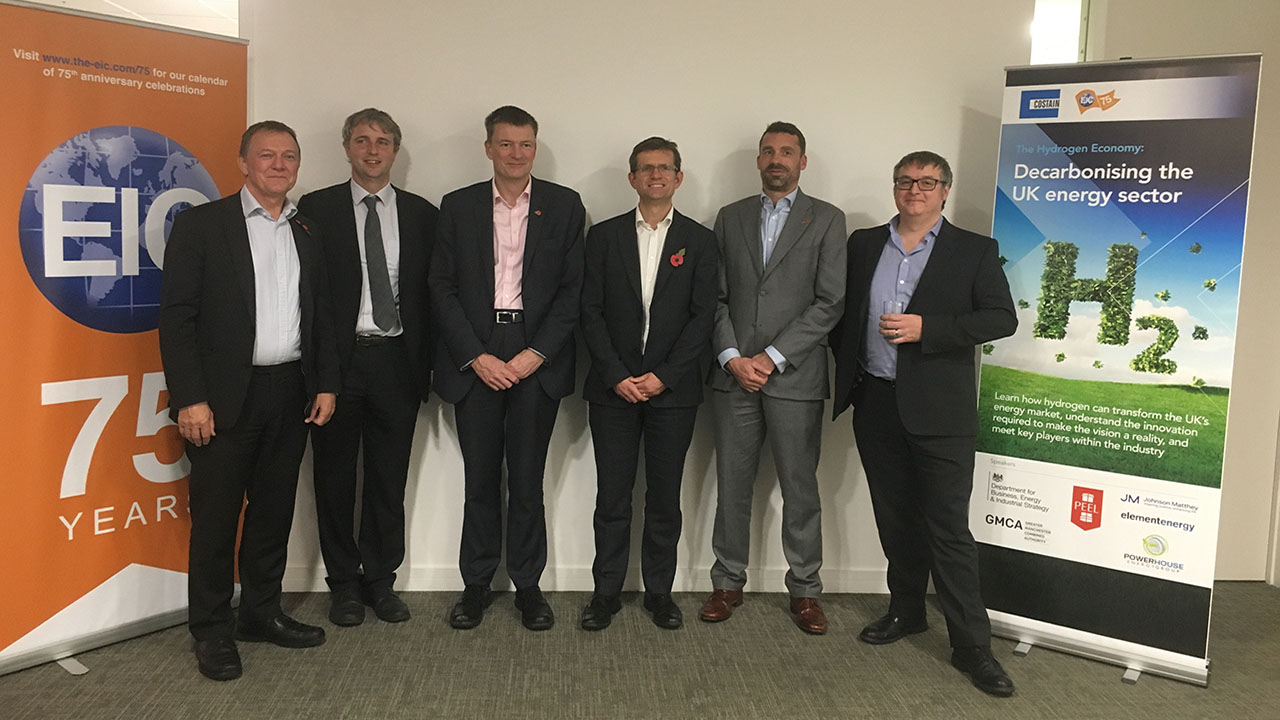The Hydrogen Economy: Decarbonising the UK energy sector

8 November 2018
Yesterday, 7 November, we hosted an Energy Industries Council (EIC) event on decarbonising the UK energy sector at our Manchester office.
The event was fully booked with over 40 delegates from the energy industries, keen to hear leading thinking on this topical and important subject.
The event involved key expert speakers from government and industry. Jon Saltmarsh, head of technical energy analysis from BEIS set the scene by discussing the Government's hydrogen innovation programmes. Jon stated “Finding cost effective, low carbon alternatives for heating is arguably the greatest technological challenge to de-carbonise the UK’s energy system. Systems innovation will be essential to make decarbonisation more acceptable for the consumer.” He ran through the various alternatives to gas boilers and the balance needed with capital costs.
This session was followed by local viewpoints from Sam Evans, head of environment policy from the Greater Manchester Combined Authority (GMCA), who explained Greater Manchester’s low carbon strategy. “In greater Manchester, we need transformative change to bring carbon neutrality forward from 2050 to 2038. There are a number of interventions available for us. For example, there is the technical potential for 9% of our electricity demand and 68% of our heat demand to come from renewable sources.” The GMCA has ambitious plans and will be launching their 5 year environment plan at the next Green Summit in March 2019.
The attendees were treated to a passionate and energetic session from Tony Smith from Peel Environmental, who described how a hydrogen economy could be established in North West England, in his words “we can either lead or get led”. Tony started with “Let’s get real with the debate. Investors may need long term price signals not short-term soundbites. We need to ask ourselves uncomfortable questions to kick this off big time.” His view was that collectively, industry and policy makers need to use data and evidence to master plan.
This then laid down the foundation for industries to give their viewpoints on what could be done to make the vision of a hydrogen economy a reality, which made up the day’s second session. Sam French, from sustainable technology company Johnson Matthey, and Ben Madden from strategic energy consultancy Element Energy described methods of producing hydrogen at scale. Sam said it was “all about deployment” and how quickly we can get a connected system to address the whole solution for decarbonisation. Traditional steam methane reformers are too expensive. Autothermal reforming is an option where energy is provided by oxygen and CO2 remains at process purity. Ben showcased Element Energy’s renewable hydrogen process using electrolytic production. From small scale hydrogen stations for passenger cars in the UK using electrolysers on site to large scale 100MW projects in the UK, Netherlands and Germany, there were success stories from across the World including from Japan and France.
Finally, Powerhouse Energy’s Bruce Nicholson introduced their pioneering process of producing hydrogen from waste material. With over 300 million tonnes of plastic produced every year, the energy that is inherent in the plastic has massive potential. Powerhouse has developed a scalable solution to recover more energy than current material recovery facilities. Distributed Modular Gasification (DMG) processes waste to produce hydrogen where you ned it. A startling fact he finished the day with was that a tonne of hydrogen from a truck of waste gives 6,000 miles of HGV motoring a day and power for industrial and commercial use.
The event generated great debate on what more needs to be done and how we can all work together. Costain’s hydrogen lead Gerard Shore, commented: “At Costain, we are committed to using our engineering expertise to support the UK’s clean growth strategy. We believe that hydrogen offers one of the most practical options for clean energy growth. Our knowledge of the UK’s gas production and distribution system, along with our extensive gas processing experience, puts us in a great position to help the UK take advantage of this opportunity. Bringing together industry, academia and policy makers at events like today’s is vital to ensure we all work together to achieve the UK’s emissions reduction targets.”
